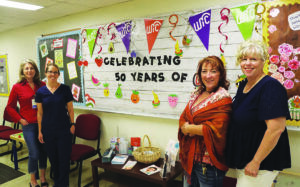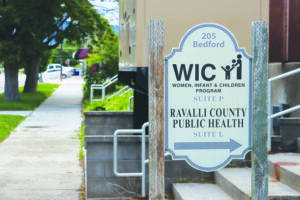
by John Dowd
Last spring, the county WIC (Women, Infants and Children) program moved under the umbrella of Ravalli County Public Health. According to staff at the local public health department, including Tiffany Webber, RN, Ravalli County Public Health Director, “It was a good program for us to inherit.” One of the reasons they believe this was expressed by the Ravalli County Public Health office administrator, Shannon McFadden, who said, “It really brought the population back.” According to both women, public health locally and across the state in general, was struggling to get in touch with the population, especially post-COVID-19, when a lot of their important work was criticized.
For Ravalli County Public Health (RCPH), there is a lot of excitement for the good this program can do for young and underserved mothers in the area. Part of their reasoning for optimism is that, as the women explained, the WIC program is different from other social programs, like food stamps. By its nature, it is much more specialized and needs a lot more input and investment from participants. Because of this, they believe it has the potential to change lives and directly target women and mothers who can make the most of it.

The program only allows pregnant women, children up to age five and postpartum women up to a year. There is also a lengthy process to be qualified for WIC. According to McFadden, the process can even seem daunting to prospective participants. One of her main duties with the program, which she takes very seriously, is aiding families in navigating the paperwork and assessments. Shannon helps them through the process that determines their eligibility due to income and other pertinent information. Many who qualify for food stamps may also be eligible for WIC. Interested participants need to bring proof of income, such as pay stubs or tax documents, along with an ID, among other things.
Once families are accepted into WIC, the program grants them access to powerful referrals, online resources and more. However, there is always a commitment required by the families. Participants must attend mandatory appointments every 90 days. During these appointments, patients will go through an extensive assessment process that will include evaluation of dietary intake, height and weight and tracking of child development and more.
The entire goal of the program, according to RCPH, is to promote education for mothers, especially first time ones. Much of the time during the appointments is spent educating and “certifying” families on proper nutrition based on their individual lives and circumstances. The dietary assessment, for both women and children, is one of the primary directives for WIC, and is where the program got its start.
WIC was founded in 1975, after a pilot program began in Pineville, Kentucky in 1974. The initial program was started by concerned physicians struggling to determine the cause of numerous cases of stunted growth in infants. The physicians came together and found the cause to be a suspected iron deficiency. Today, the program has over 6.7 million participants, and is celebrating 50 years.
The modern dietary intake assessment hopes to determine deficiencies, and direct “food packets” that participants will receive. These food benefits are catered directly to patient needs and the program employs help from a dietitian to help make this happen.
The food packets they distribute are pre-loaded credit cards that work at most grocery stores, and only allow the purchase of certain items marked applicable to WIC. These markings can be found on items at most grocery stores across the country. The food packets are tailored to patients through their WIC visits, and provide supplemental nutrition to a regular diet. Participants have access to an approved food list to help them stick to healthy options that address their specific nutritional concerns.
“We don’t want to just throw food at people and say, good luck,” said Webber. “We want to provide them with education to keep their families healthy.” This is why the program calls completing certain steps in the process “certifications.”
“The whole point of this is to make an impact,” added Webber.
As stated before, the referrals are powerful, and can help women and children seek help and treatment from numerous professionals. RCPH WIC also provides immunizations to its participants, and each visit is hosted by one of two full-time nurses employed by RCPH, both of whom are registered lactation consultants as well.
The transfer process has not been easy, according to the women at RCPH, but they also say it has been well worth it. Webber is extremely proud of her team, saying that “it is a huge testament to their dedication,” when speaking specifically about the nurses. They had to take the project on as soon as it was transferred, learn about what the program does, become certified lactation consultants and take on new patients. According to Webber, the inside of the RCPH office has even undergone somewhat of a makeover to reorganize and to allow the intake of more patients, specifically participants of WIC.
Fortunately for the women now handling WIC, RCPH is less robust than other public health jurisdictions in the state. This allows them more room to handle WIC, though the program is still new to them. Unfortunately, some programs, like their local farm produce program, may face their last year this year. These will be put on the back-burner until the RCPH team can figure out all the logistics of including WIC.
This year for the last time, Ravalli County WIC will be partnering with local farmers and the farmers market. The partnership will provide WIC participants with $30 vouchers to spend at local food stands. Participating farmers will have signage showing that they are WIC affiliated. This WIC partnership strives to bring local and healthy produce to the tables of WIC participants, and this will be the last year of the farmers program until it is reinstated by RCPH.
“We want to focus on what WIC is,” said Webber, explaining that they intend to bring it back online in a couple of years. The concern is also driven by the drop in participating farmer numbers, as well as the RCPH team now taking on this additional program.
However, even with everything on their plates, the team at RCPH hopes getting the word out about this program will get more people involved with RCPH opportunities. “I think if a lot more moms knew about the program we would see a lot more involvement,” said Mattie Qualm, RN. “It’s just awesome, the whole program!”
When speaking on the other things RCPH does, Webber said they host numerous programs many people are not aware of. Public health is decentralized and takes direction from the County Commission. They handle programs like a car seat program, tobacco prevention for youth development, a ‘skull savers’ program that provides bike and skateboard helmets to youth, immunization programs, and their primary function is to track communicable diseases throughout the communities. On top of all that, the same group now handles WIC, locally. WIC is a nationwide program, adopted by the state, and administered locally.
According to the director, everything they do is to, “ensure that the community stays healthy.” RCPH also has a public walk-in breastfeeding room for mothers without a safe place to go. The space is open to the public during regular RCPH business hours. They are open 8 a.m. to 5 p.m. Monday through Friday, and closed lunch hours.
This summer, the program will be doing giveaways to celebrate 50 years of WIC. These will include pots and pans, bakeware, cook books, personal blenders and more. Monday, July 15 and Thursday July 25, RCPH will be issuing farm program bags on a first-come-first-serve basis. This will take place from 8 a.m. to 11:30 p.m. and from 1 p.m. to 4:30 p.m. These are for WIC participants only.
For more information about RCPH or WIC, interested parties can visit ravalli.us, or google Ravalli County Public Health, to navigate to their landing page for more information about everything they do. Interested parties can also call them at (406) 375-6672.
Hobo Hilton says
My hope is our “Elected Officials” will read this article. Thank you, John Dowd for this information.
One line above is quoting a staggering number… “Today, the program has over 6.7 million participants..”.
Ravalli County is rapidly becoming a two tier society. Every day there are comments about the need for affordable housing. This morning a Cessna Citation left Hampton Beach, New York and will land at the Hamilton Airport at 12:34 pm. The Valley has become the “Playground of the Rich and Famous”. The job openings here are in the Service Industry. These workers struggle to pay the increasing rent. The red flags are waving. The land owners and businesses are being taxed in order to feed an increasing number of people.
This situation is unsustainable. My question to my elected official is “What is your plan” ?